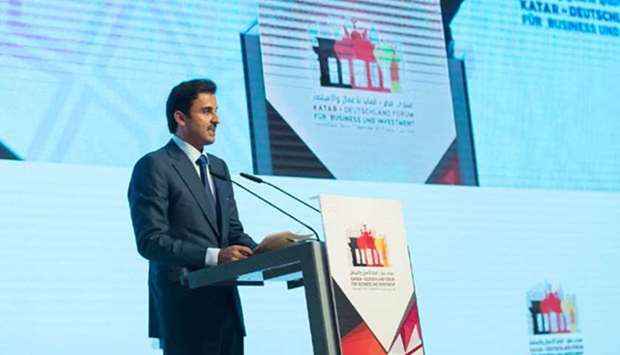Qatar’s non-hydrocarbon sector is the leading industry driving the country’s economy, according to His Highness the Amir Sheikh Tamim bin Hamad al-Thani, who noted that major projects being undertaken in Qatar provide many investment opportunities for German companies.
His Highness the Amir made the statement in a speech delivered during the 9th Qatar-Germany Business and Investment Forum held on Friday at the Marirtim Hotel in Berlin.
“Qatar economy's main driver at this stage is the non-oil sector, which relies mainly on massive investments in infrastructure, especially education, health, transportation, and constructions required for hosting the 2022 FIFA World Cup,” the Amir noted.
His Highness the Amir stressed that development projects in Qatar “provide great opportunities for German companies” to increase their contribution to the development of Qatar’s economy in other sectors.
The sectors also include infrastructure and construction sector, as well as education, training and research, and small and medium-sized enterprises (SMEs).
“Germany is a pioneer in these two fields. In this context, I refer to the constructive co-operation between our scientific and university institutions,” His Highness the Amir continued.
The Amir also said the implementation of the ‘1st National Strategy 2011-2016 resulted in achieving progress in Qatar’s economic diversification.
The Amir said Qatar is starting to execute the ‘2nd Strategy 2018-2022’, which will focus on increasing the private sector investments in projects by providing incentives, enhancing capacities, offering public-private partnership projects, and attracting direct foreign investments.
“Over the recent years, the state has developed and made pivotal amendments to a number of legislations to achieve this end, including the commercial companies law, the non-Qatari capital investment regulation law, the new free zones law, and the procedures for the development and expansion of industrial areas and logistics zones,” the Amir said.
From 2000 to 2014, the Amir said Qatar's GDP “reached unprecedented levels of growth worldwide,” which was coupled with macroeconomic indicators pertaining to national savings, domestic investment, current account, and public budget.
“Needless to say, these growth rates have subsequently dropped because of the collapse of oil and gas prices. But Qatar’s economy has proven its resilience vis-a-vis this decline and against the backdrop of the difficult circumstances our region is passing through.
“However, Qatar's GDP per capita is still among the highest in the world, if not the highest. The World Bank expects our economy to grow by 2.8% in 2018 and by 3% in 2019 and 2020, the Amir said.
His Highness the Amir added: “Also, the credit rating and competitiveness reports released by international institutions have continued to place Qatar at high international rankings.”
“Qatar economy's main driver at this stage is the non-oil sector, which relies mainly on massive investments in infrastructure, especially education, health, transportation, and constructions required for hosting the 2022 FIFA World Cup,” the Amir noted.
His Highness the Amir stressed that development projects in Qatar “provide great opportunities for German companies” to increase their contribution to the development of Qatar’s economy in other sectors.
The sectors also include infrastructure and construction sector, as well as education, training and research, and small and medium-sized enterprises (SMEs).
“Germany is a pioneer in these two fields. In this context, I refer to the constructive co-operation between our scientific and university institutions,” His Highness the Amir continued.
The Amir also said the implementation of the ‘1st National Strategy 2011-2016 resulted in achieving progress in Qatar’s economic diversification.
The Amir said Qatar is starting to execute the ‘2nd Strategy 2018-2022’, which will focus on increasing the private sector investments in projects by providing incentives, enhancing capacities, offering public-private partnership projects, and attracting direct foreign investments.
“Over the recent years, the state has developed and made pivotal amendments to a number of legislations to achieve this end, including the commercial companies law, the non-Qatari capital investment regulation law, the new free zones law, and the procedures for the development and expansion of industrial areas and logistics zones,” the Amir said.
From 2000 to 2014, the Amir said Qatar's GDP “reached unprecedented levels of growth worldwide,” which was coupled with macroeconomic indicators pertaining to national savings, domestic investment, current account, and public budget.
“Needless to say, these growth rates have subsequently dropped because of the collapse of oil and gas prices. But Qatar’s economy has proven its resilience vis-a-vis this decline and against the backdrop of the difficult circumstances our region is passing through.
“However, Qatar's GDP per capita is still among the highest in the world, if not the highest. The World Bank expects our economy to grow by 2.8% in 2018 and by 3% in 2019 and 2020, the Amir said.
His Highness the Amir added: “Also, the credit rating and competitiveness reports released by international institutions have continued to place Qatar at high international rankings.”


